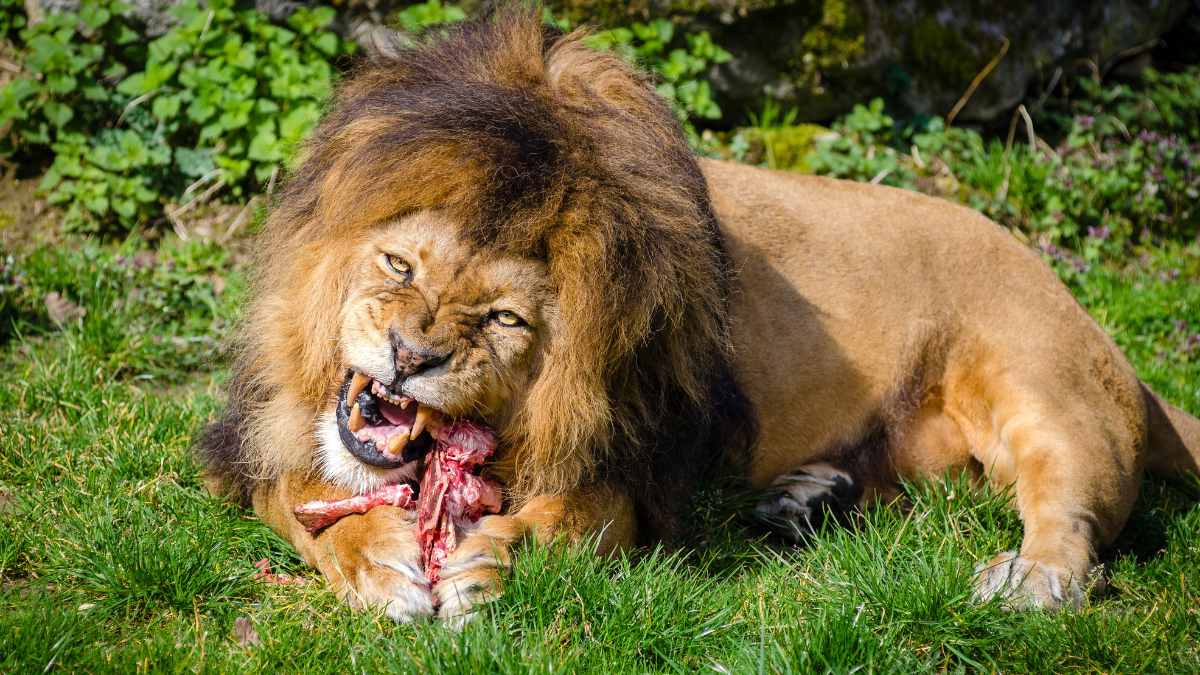Lions, known as the “kings of the jungle,” are majestic creatures that have captured the imagination of people around the world. These powerful big cats are at the top of the food chain, but have you ever wondered what fuels their strength and vitality?
Table of Contents
Introduction
Lions are the savanna’s top predators. They are magnificent and powerful beings, and their diet reflects their position at the top of the food chain. Lions are carnivores, and their diet is almost entirely composed of meat. They will eat zebras, wildebeests, antelopes, and even giraffes. Lions have been observed scavenging on carrion and eating small animals such as rodents and birds.
What are the nutritional needs of a lion?
Lions have high nutritional requirements, and their diet must include all of the nutrients they require to survive and thrive. Lions need the most protein, fat, and calcium. Protein is required for the formation and repair of muscle tissue, and lions need a high protein intake to maintain their strength and athleticism. Lions must consume a lot of fat to keep their body temperature stable in the hot African sun. Calcium is required for strong bones and teeth, and lions must consume a sufficient amount of calcium to remain healthy.
What are the best lion foods?
Lions prefer foods that are high in protein, fat, and calcium. The following are some of the best lion foods:
- Beef
- Lamb
- Goat
- Bison
- Deer
- Buffalo
- Zebra
- Wildebeest
- Antelope
- Giraffe
- Rabbits
- Guinea pigs
- Mice
- Rats
How much food does a lion need?
A lion’s food requirements are determined by its size, age, and activity level. Adult male lions require approximately 7 kilograms of meat per day, whereas adult female lions require approximately 4.5 kilograms of meat per day. Cubs must consume up to 15% of their body weight in a single meal.
How often do lions eat?
Lions are not particularly active animals, and they do not require frequent feedings. They eat every 2-3 days on average. They may eat more than once per day if they have just made a large kill.
What should I avoid feeding my lion?
A few foods should be avoided when feeding your lion. These foods are as follows:
Raw meat contains bacteria that can make your lion sick.
Cooked bones: Cooked bones can splinter and injure your lion’s internal organs.
Salt should be avoided because it is toxic to lions.
Dairy products should be avoided because they can cause digestive issues in lions.
Junk food is unnutritious and can cause your lion to become overweight or obese.
How can I make sure that my lion is getting the right food?
Feeding your lion a commercial lion diet is the best way to ensure that it is getting the right food. These diets are designed to give lions all of the nutrients they require. If you feed your lion a home-cooked diet, ensure it is balanced and nutritious. You can work with a veterinarian or animal nutritionist to develop an appropriate home-cooked diet for your lion.
Conclusion
Lions are carnivores, so their diet should be almost entirely composed of meat. Lions prefer foods that are high in protein, fat, and calcium. Lions should be fed every 2-3 days and should not be fed raw meat, cooked bones, salt, dairy products, or junk food. If you are unsure about what to feed your lion, always seek the advice of a veterinarian or animal nutritionist.
FAQs
- Do lions ever eat plants?
- While lions are primarily carnivorous, there have been rare instances of lions consuming plant material, such as grass.
- What happens if lions don’t get enough food?
- If lions don’t get enough food, they become weak, and lethargic, and may even die during extended periods of food scarcity.
- How much do lions eat in a day?
- Adult lions can consume around 10 to 25 pounds of meat in a single meal and may not eat again for several days.
- Why do lions hunt in groups?
- Lions hunt in groups to increase their chances of a successful kill, as teamwork allows them to take down larger and more formidable prey.
- Can lions adapt to different diets in captivity?
- Yes, lions in captivity can adapt to specialized diets, and zoos work to provide them with the best possible nutrition.
